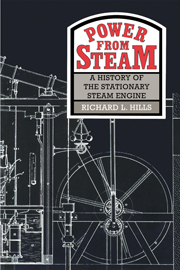Book contents
- Frontmatter
- Contents
- Preface
- Acknowledgements
- List of figures
- List of tables
- 1 The noblest machine
- 2 The impellent force of fire
- 3 Common old smoaking engines
- 4 The economy of power
- 5 The devil of rotations
- 6 Such unbounded power
- 7 Good servants but bad masters
- 8 An uncultivated field
- 9 The new theory of heat
- 10 The internal operation of the machine
- 11 Such absolute smoothness
- 12 Twinkle twinkle little arc
- 13 The drive for efficiency
- 14 An economical source of motive power
- 15 The most economical mode of obtaining power
- Notes
- Bibliography
- Index
6 - Such unbounded power
Early high pressure engines (1790–1835)
Published online by Cambridge University Press: 01 June 2011
- Frontmatter
- Contents
- Preface
- Acknowledgements
- List of figures
- List of tables
- 1 The noblest machine
- 2 The impellent force of fire
- 3 Common old smoaking engines
- 4 The economy of power
- 5 The devil of rotations
- 6 Such unbounded power
- 7 Good servants but bad masters
- 8 An uncultivated field
- 9 The new theory of heat
- 10 The internal operation of the machine
- 11 Such absolute smoothness
- 12 Twinkle twinkle little arc
- 13 The drive for efficiency
- 14 An economical source of motive power
- 15 The most economical mode of obtaining power
- Notes
- Bibliography
- Index
Summary
In 1834, on the occasion of an appeal for a memorial to Watt which would be erected in Westminster Abbey, the effect of his steam engine was summed up in the following words:
A time will come when the science of destruction shall bend before the arts of peace; when the genius which multiplies our powers, which creates new products, which diffuses comfort and happiness among the great mass of people, shall occupy, in the general estimation of mankind, that rank which reason and common sense now assign it.
Then Watt will appear before the grand jury of the inhabitants of the two worlds. Everyone will behold him, with the help of his steam engine, penetrating in a few weeks into the bowels of the earth, to depths which, before his time, could not have been reached without an age of the most toilsome labour, excavating vast mines, clearing them in a few minutes of the immense volume of water which daily inundates them, and extracting from a virgin soil the inexhaustible mineral treasures which nature has there deposited.
Combining delicacy with power, Watt will twist, with equal success, the huge ropes of the gigantic cable by which the man-of-war rides at anchor in the midst of the raging ocean, and the microscopic filaments of the aerial gauze and lace of which fashionable dresses are so principally formed.
A few strokes of the same engine will bring vast swamps into cultivation; and fertile countries will also thus be spared the periodical returns of deadly pestilential fevers, caused in those places by the heat of the summer sun. […]
- Type
- Chapter
- Information
- Power from SteamA History of the Stationary Steam Engine, pp. 95 - 119Publisher: Cambridge University PressPrint publication year: 1989



